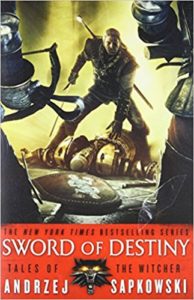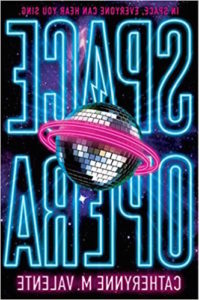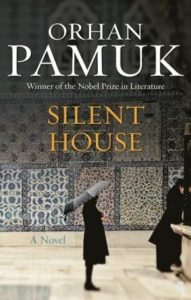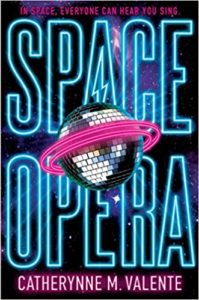Sword of Destiny collects six stories that take place early in the personal history Geralt of Rivia, a Witcher; that is, a human who has gained supernatural fighting abilities through a combination of training and magic. He is the central figure of four previous books by Sapkowski: The Last Wish, Blood of Elves, The Time of Contempt, and Baptism of Fire. (The order of publication in their original Polish may be a bit different.) The remaining three Witcher books — The Tower of the Swallow, The Lady of the Lake, and Season of Storms — are now available in English.
I was first introduced to Sapkowski in 2012 by a Russian friend who was surprised, ok, astonished, that such a massively popular author was not widely known in the English-speaking world. The appearance of the later Witcher books nearly two decades after they were originally written means that they are doubly distant: translated from another language and culture, and transported through time. The gap between 1990s fantasy and 2010s fantasy may not be as great as, say, the gap between 1950s science fiction and 1970s science fiction, but it is still noticeable.
Sword of Destiny most closely resembles The Last Wish, as both are loosely connected stories of Geralt’s various adventures. Sword of Destiny lacks the framing narrative of The Last Wish and simply presents the tales; as a book, it is none the worse for doing without the frame. The stories are classic fantasy adventures, including a dragon hunt, a duel, and a tale of misdirection featuring a doppelgänger. Sapkowski subverts each of them, changing the roles and motivations to confound the expectations of readers expecting the typical.
The stories in the second half of the book concern the early life of Ciri, the Child of Destiny who figures so prominently in the main sequence of Witcher novels: where she came from, how she first met Geralt, how that set larger events in motion. There is also an unusually forthright statement of a pro-choice position, which I presume would have been noticeable and controversial in 1990s Poland, when the Polish Pope was still alive and clerical Catholicism very much a force in public life in Sapkowski’s country.
“My mother? No, Calanthe. I presume she had a choice … Or perhaps she didn’t? No, but she did; a suitable spell or elixir would have been sufficient … A choice. A choice which should be respected, for it is the hold and irrefutable right of every woman.” (p. 345, ellipses in original)
All of them are solid fantasy adventures, with the various twists keeping them from feeling too time-worn. For readers of the whole series, the appearance of Ciri adds depth and fills in important pieces of Sapkowski’s longer narrative. For newcomers to the Witcher, Sword of Destiny would be a perfectly acceptable starting point. I enjoyed these stories and look forward to three more books concerning Geralt.




